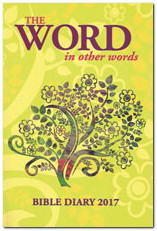THE WORD
1 Jn 5,14-21 / Jn 2.1-1 1
On the third day there was a wedding at Cana in Galilee, the mother of Jesus was there. Jesus and his disciples were also invited to the wedding. When the wine ran short, the mother of Jesus said to him, 'They have no wine.' And Jesus said to her, "Woman, how does your concern affect me? My hour has not yet come." His mother said to the servers 'Do whatever he tells you.' Now there were six stone water jars there for Jewish ceremonial washings, each could hold twenty or thirty gallons. Jesus told them, "Fill the jars with water." So they filled them to the brim. Then he told them, "Draw some out now and take it to the headwaiter." So they took it. And when the headwaiter tasted the water that had become wine, without knowing where it came from (although the servers who had drawn the water knew), the headwaiter called the bridegroom and said to him, "Everyone serves good wine first, and then when people have drunk freely, an inferior one; but you have kept the good wine until now."
Jesus did this as the beginning of his signs in Cana in Galilee and so revealed his glory, and his disciples began to believe in him.
IN OTHER WORDS
Oftentimes I use this picture of Mother and Son, Mary and Jesus, and the dialogue between them, to answer questions of my non-Catholic students: "Why do you pray to Mary? Why do you have Mary at your altar?"
"Son, they have no more wine."
"My hour has not yet come."
"Do whatever he tells you."
Try to feel the deep connection between Mary and Jesus in this brief dialogue: few words but powerful; no persuasion, just faith; no arguments, only understanding of the situation at hand.
Mary's open heart saw the need right there at the celebration. She felt for the family, for the new couple who might be criticized for lack of wine, and end the celebration with dissatisfaction. Without being requested, she extended assistance, through Jesus. Before other guests would discover the "no more wine" or "no more drinks" situation, here came Mary's big heart wanting to save the situation, save the newlyweds from shame, through Jesus. Jesus felt the urgency of Mary's call to save that very moment. As Mary and Jesus enjoyed the wedding party, they did their mission.
In everyday life, this saving mission of Mary through Jesus continues - comforting us in our insecurities and fears, saving us from harm or danger when we call on Mary's protection from trouble with others, from evil, destruction, or death. Indeed theirs is a faith-filled relationship that gives life - one that brings out the best, one that saves.
Jesus' Yes to save the newly wedded couple brought about super abundant blessings - the best of all wine! When we give our best selves for others, we experience joy and fulfillment "to the brim". Graces overflow in us beyond our understanding, sustaining us in our day-to-day life.
- Sister Tessa D. Artita, SSpS (Tarlac City)
The Word in other words 2017
An annual project of Logos Publications, The WORD in Other Words Bible Diary contains daily scripture readings and reflections written by priest, brothers, and sisters of the three congregations founded by St. Arnold Janssen (the SVD, SSpS, and SSpSAP). It hopes to serve as a daily companion to readers who continually seek the correlation of the Word of God and human experience.


